Overview
The article delineates seven strategies for achieving patient centricity in healthcare, emphasizing the integration of patient insights, data analytics, and innovative care models to enhance individual engagement and outcomes. Each strategy is supported by various case studies and statistical evidence, underscoring the significance of tailoring healthcare approaches to address the unique needs of patients. This tailored approach not only improves satisfaction but also enhances treatment effectiveness across the industry, thus prompting a critical examination of current practices. By focusing on these strategies, healthcare providers can foster a more patient-centered environment, ultimately leading to better health outcomes.
Introduction
In the rapidly evolving landscape of healthcare, the emphasis on patient-centricity has never been more pronounced. Organizations are harnessing the power of comprehensive data analytics to transform patient engagement and improve outcomes.
For instance, CareSet’s innovative Medicare insights illuminate treatment patterns, while Astellas Pharma’s dedicated efforts integrate patient feedback into drug development. This shift towards more personalized care models is reshaping the industry.
This article delves into various case studies and strategies employed by leading healthcare entities, showcasing how data-driven approaches are enhancing patient experiences and driving significant economic benefits.
As the healthcare sector navigates the complexities of patient needs, the commitment to fostering collaborative relationships between patients and providers stands at the forefront of improving health outcomes.
CareSet: Empower Patient Centricity with Comprehensive Medicare Data Insights
CareSet excels in extracting and interpreting complex Medicare claims information, providing stakeholders with critical insights that drive patient centricity initiatives. By analyzing over $1.1 trillion in yearly claims data, CareSet identifies treatment trends and care deficiencies, enabling medical organizations to tailor their services to better meet individual needs. This analytics-driven approach significantly enhances individual involvement and emphasizes patient centricity, with research indicating that combined individual-provider satisfaction can increase by 31% when both parties utilize shared analytics dashboards. The importance of Medicare information analysis in fostering individual focus is underscored by the upcoming frameworks for individual involvement analytics standards being developed by the Office of the National Coordinator for Health Information Technology, anticipated to be finalized by 2025. CareSet is poised to play a pivotal role in this evolving landscape by delivering the essential insights that medical organizations need to comply with these standards.
Furthermore, a comprehensive economic evaluation reveals that the return on investment (ROI) for involvement analytics averages 3.2:1 over three years, with some organizations achieving ROIs as high as 5.7:1, according to the Financial Management Association. This statistic highlights the financial benefits of implementing effective strategies for engaging individuals in their care. Real-world examples demonstrate how medical organizations leverage Medicare claims information to enhance their approaches to patient centricity. For instance, a case study on an oncology treatment provider illustrates how timely communication with healthcare professionals regarding treatment options, such as Qinlock for Gastrointestinal Stromal Tumor (GIST), can significantly improve outcomes for individuals. The implementation of individual engagement analytics has led to substantial operational cost savings, including reduced administrative expenses and improved resource allocation, showcasing the tangible impact of data insights on healthcare delivery. CareSet’s commitment to providing high-quality, comprehensive Medicare insights empowers clients to navigate the complexities of the healthcare environment effectively, ultimately enhancing health outcomes and optimizing the lifecycle management of pharmaceutical products.
Astellas Pharma: Integrate Patient Insights through the Patient Centricity Team
Astellas Pharma has established a dedicated Centricity Team focused on integrating insights from individuals into their drug development processes. By actively engaging with individuals and understanding their experiences, Astellas aims to create therapies that embody patient centricity and genuinely address the needs of those receiving care. This approach centered on patient centricity not only cultivates trust but also enhances the relevance of their products in the market, leading to increased satisfaction and adherence.
Notably, statistics indicate that the engagement solutions market for clients is projected to experience substantial growth from 2025 to 2034. This anticipated expansion underscores the growing importance of incorporating consumer insights into drug development, which reflects the principle of patient centricity at the heart of Astellas’s initiatives. By leveraging analytics to identify individual preferences and challenges, Astellas reaffirms its commitment to engaging with individuals.
In this context, CareSet Systems has launched innovative analytics products designed to refine drug launch strategies and provide deeper insights into the health sector. These tools, featuring advanced analytics and real-time data integration, empower pharmaceutical companies to enhance their understanding of and interactions with medical providers, ultimately improving outcomes for individuals.
For instance, a recent case study illustrated how a global pharmaceutical company boosted retention rates in a Phase III clinical trial for a diabetes medication by utilizing engagement analytics. This strategy resulted in an impressive retention increase from 76% to 92%, showcasing the tangible benefits of integrating insights from individuals into clinical processes—a practice that Astellas is keen to replicate.
Furthermore, Astellas Pharma’s Centricity Team emphasizes the value of shared analytics dashboards, which have been shown to elevate overall provider satisfaction by 31%. This statistic holds particular significance for Astellas, as it reflects their commitment to fostering collaborative interactions between individuals and healthcare providers. By prioritizing patient insights and employing tools such as those from CareSet, which utilize Medicare data to enhance interaction strategies, Astellas not only advances the development of relevant therapies but also fosters patient centricity and cultivates enduring relationships with patients, ultimately refining drug development outcomes.
For pharmaceutical market access managers, embracing patient centricity strategies can lead to improved engagement and satisfaction within their own practices.
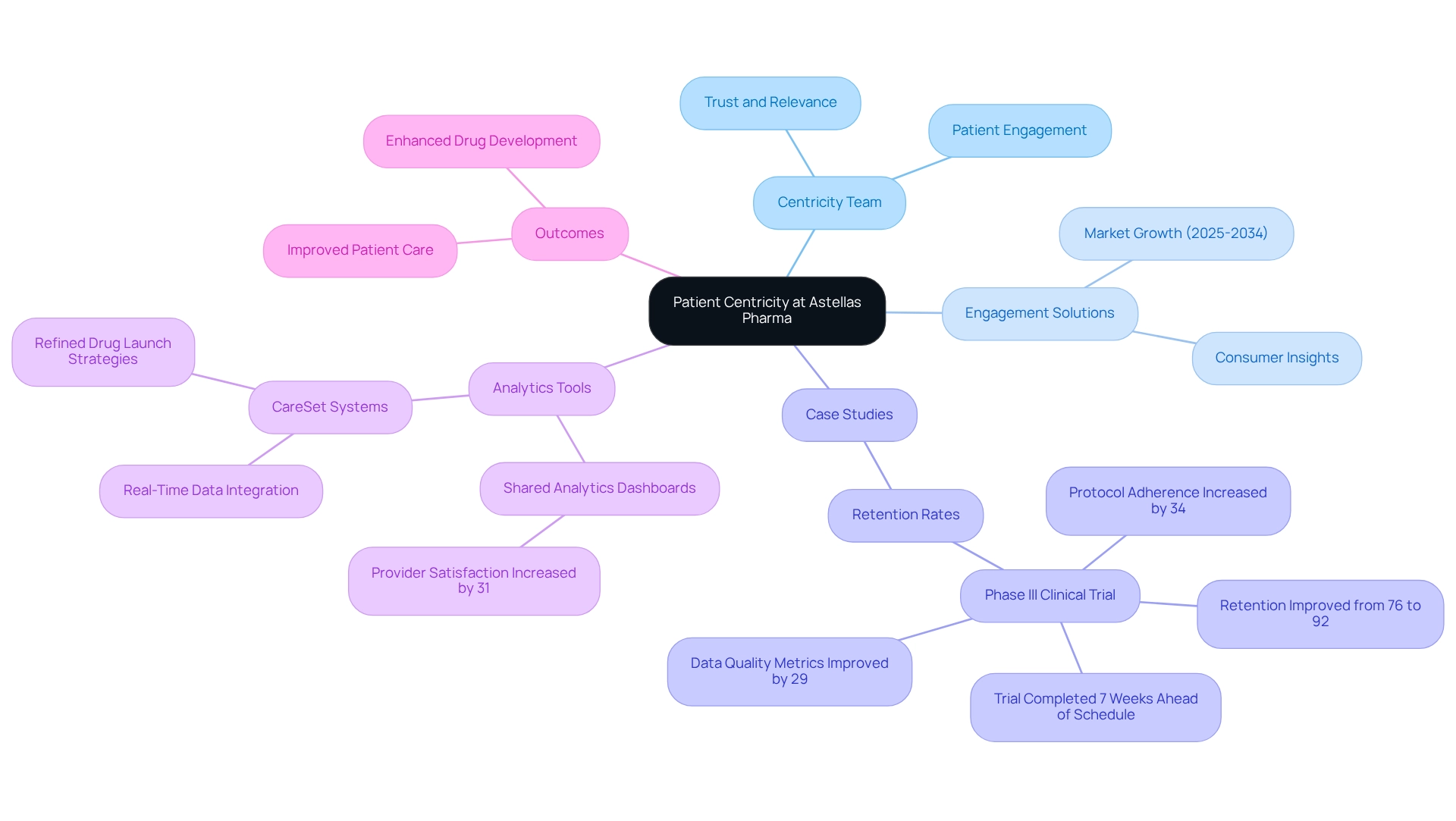
IQVIA: Operationalize Patient-Centricity with Holistic Data Approaches
IQVIA underscores the critical importance of adopting a holistic approach to patient centricity, integrating diverse data sources to inform clinical trials and healthcare strategies. By leveraging real-world evidence (RWE) and actively incorporating feedback from individuals, IQVIA empowers organizations to design studies that reflect patient centricity throughout the clinical journey. This implementation of client-centricity streamlines trial processes and significantly enhances participant engagement and satisfaction. Notably, studies indicate that utilizing real-world evidence can enhance the efficiency of clinical trials by up to 30%, demonstrating its pivotal role in contemporary medical practices. Furthermore, the estimated clinical trial cost per drug by therapeutic class from 2015 to 2017 highlights the financial implications of these trials, reinforcing the importance of RWE in improving efficiency. As Scott Gottlieb, MD, former US FDA Commissioner, stated, ‘Real-world evidence offers flexibility for postmarket safety and effectiveness information collection, supports decision-making regarding healthcare, enhances information sets already being gathered, and enables significant advancements in the clinical care of COVID-19 individuals in a relatively brief timeframe.’
As the landscape evolves, the incorporation of diverse information sources becomes increasingly essential for creating effective strategies centered around individuals, ensuring that solutions are both pertinent and responsive to needs. CareSet Systems’ recent introduction of innovative information science products further enhances drug launch strategies and medical insights, demonstrating a commitment to improving patient centricity in the pharmaceutical sector. Additionally, the case study on oncology treatment choices illustrates how utilizing Medicare information can enhance healthcare provider involvement, ultimately resulting in improved outcomes for individuals. The validation approach for RWE tools, explored in the case study titled ‘Validation Approach for Real-World Evidence Tools,’ illustrates the increasing need for validation in RWE tools and processes, thereby supporting the argument for a holistic approach to patient centricity.
The importance of a robust data governance framework, as highlighted in recent news, further emphasizes the necessity of reliable data in achieving patient centricity.
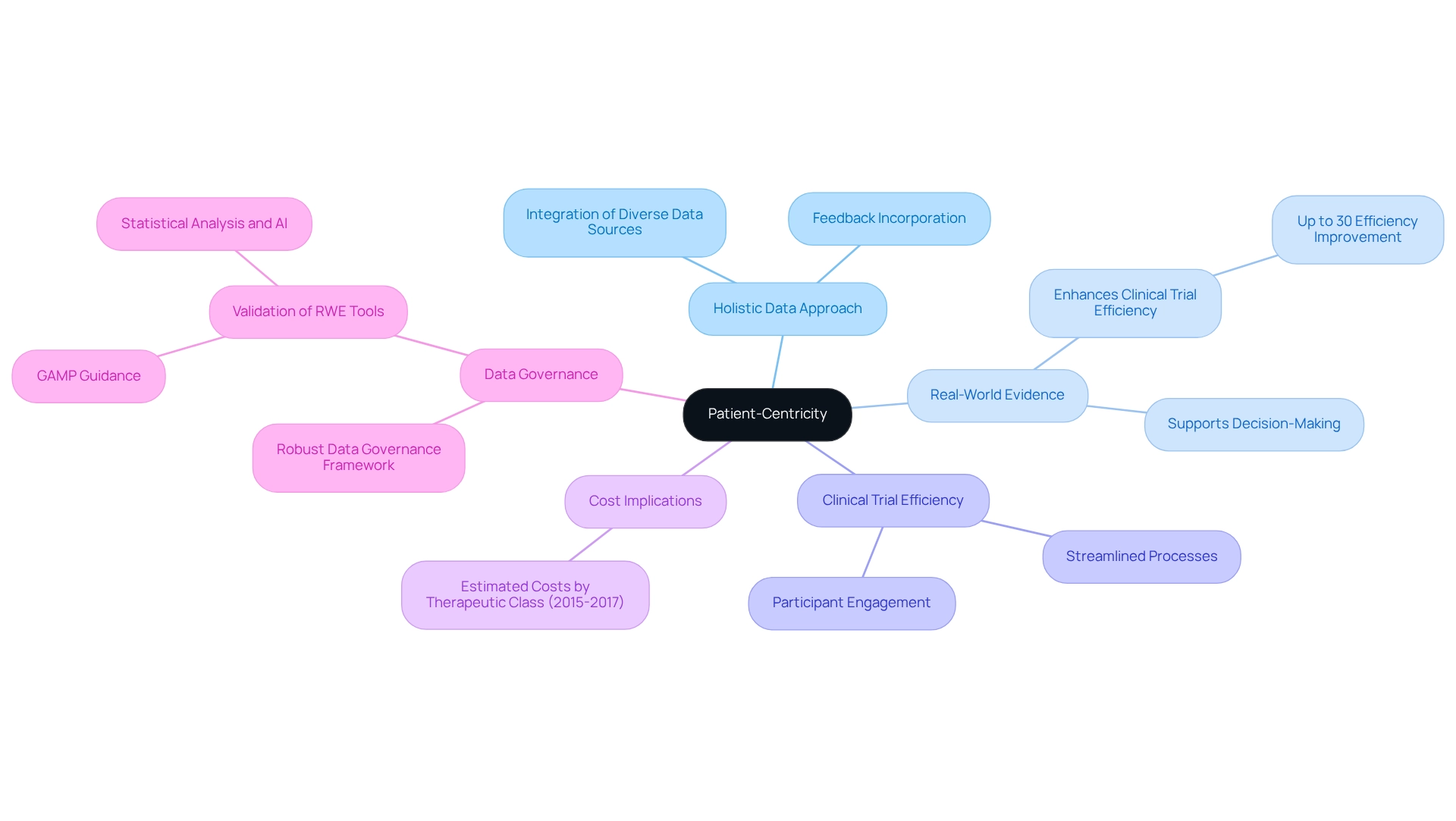
MD Group: Enhance Clinical Trials with Decentralized and Hybrid Patient-Centric Models
MD Group pioneers the transformation of clinical trials by utilizing decentralized and hybrid models that emphasize patient centricity for individuals. By allowing individuals to engage from their homes, these innovative methods greatly lessen travel difficulties, leading to enhanced recruitment and retention rates. In fact, studies indicate that decentralized trials can enhance recruitment rates by up to 30% compared to traditional methods, while also increasing retention by addressing the needs of participants more effectively. CareSet’s integration of more than 100 external data sources further supports these patient-centric models, providing a comprehensive view that enhances decision-making.
This strategy focused on patient centricity not only boosts participation but also ensures that clinical trials are more representative of diverse patient populations. As a result, the outcomes derived from these trials are more relevant and applicable to real-world scenarios, ultimately enhancing the quality of healthcare solutions developed. Furthermore, the integration of blockchain technology for secure data sharing among trial stakeholders has improved data integrity, fostering trust and transparency throughout the research process. This is crucial as Laura Wood, Senior Press Manager, notes, “As these companies continue to invest in digital health technologies and virtual platforms, decentralized trials become an integral part of their clinical development strategies.”
MD Group’s dedication to these hybrid models is clear in their recent case studies, including the one titled ‘Long-Term Strategic Growth for Healthcare Partners,’ which illustrates how such approaches have resulted in significant enhancements in trial participation and client satisfaction. By concentrating on patient centricity, MD Group is not only promoting clinical research but also establishing new benchmarks for engagement in the medical field.
Tiga Health: Shift to Patient-Centric Care for Improved Outcomes
Tiga Health underscores the critical shift towards patient centricity in care models that prioritize the unique needs and preferences of each individual. By implementing personalized treatment plans and actively engaging individuals in their healthcare decisions, Tiga Health has achieved notable improvements in health outcomes. Studies show that person-centered care (PCC) improves individuals’ perception of treatment necessity by over six times, illustrating its effectiveness in encouraging a sense of ownership over health management. This model not only enhances satisfaction among individuals but also fosters a collaborative atmosphere where they are encouraged to take control of their health.
Moreover, the potential for PCC to lower unnecessary medical costs emphasizes its economic advantages, strengthening the need for medical systems to embrace patient centricity. Case studies, like those carried out by CareSet, show that improved patient involvement through PCC is linked to better treatment results and lower medical expenses. Specifically, CareSet’s case study on the oncology treatment manufacturer illustrates how utilizing Medicare data can significantly enhance engagement with medical providers regarding the 4th line of therapy, particularly for treatment options like Qinlock for Gastrointestinal Stromal Tumor (GIST).
Tiga Health’s dedication to tailored care is additionally backed by expert perspectives. Mousa Kadaei Moses declares, “The concept of patient centricity in care is set to further transform the medical field, changing it from merely a service to a more engaging experience.” This viewpoint highlights that such models are crucial in transforming healthcare into a more interactive and rewarding experience for individuals.
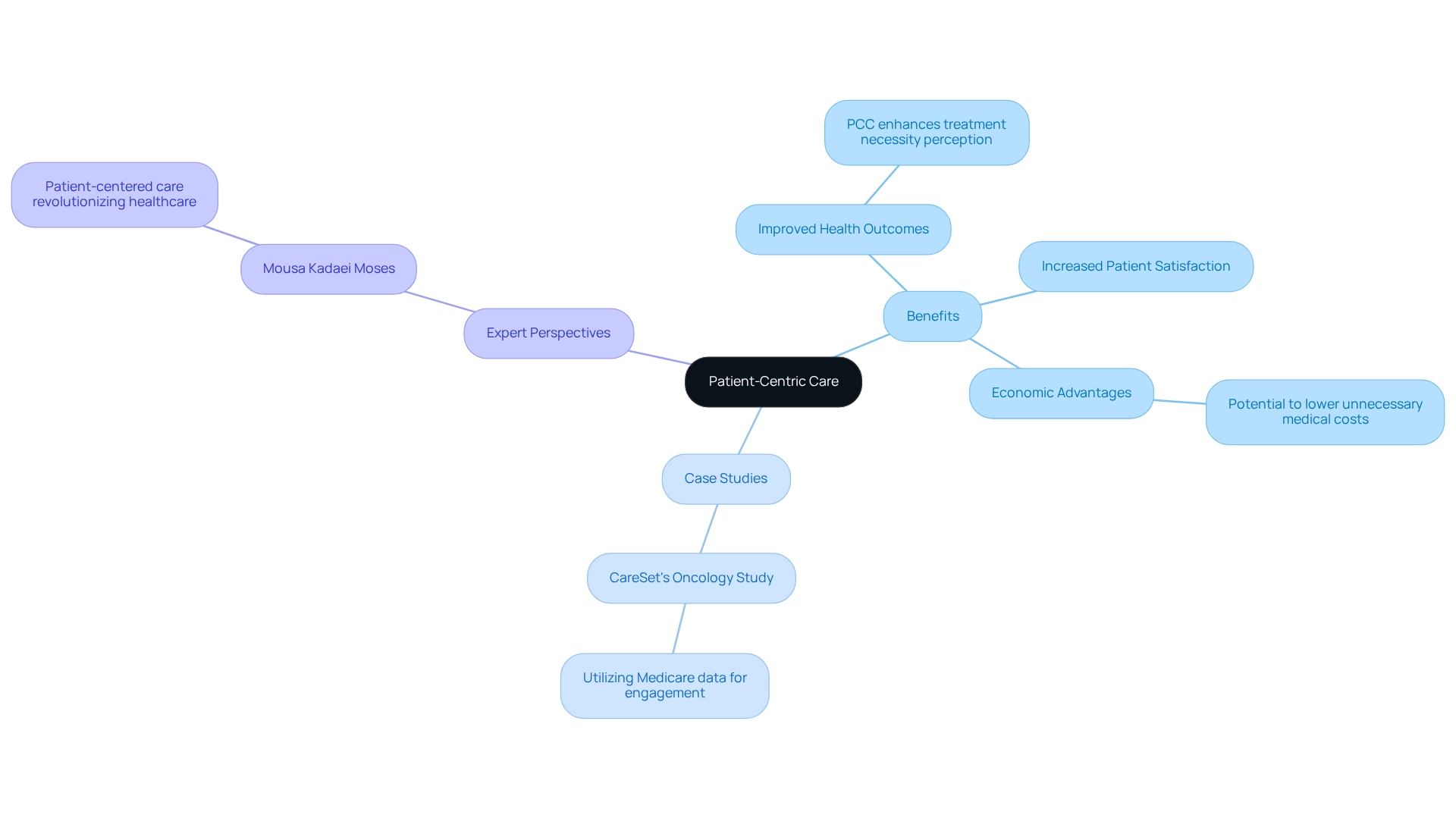
Daiichi Sankyo: Address Global Challenges in Patient Centricity Initiatives
Daiichi Sankyo is resolutely committed to addressing global challenges in healthcare by actively engaging with individuals and stakeholders across diverse regions. Their initiatives underscore the importance of understanding local community needs, facilitating tailored strategies that resonate with specific groups. This approach not only cultivates a culture of inclusivity and collaboration but also significantly enhances patient centricity and outcomes on a global scale. Notably, recent statistics reveal that value-based care has resulted in a 7% reduction in disparities in medical services, underscoring how Daiichi Sankyo’s strategies contribute to this positive trend by effectively addressing local needs.
Furthermore, by leveraging comprehensive Medicare data solutions from CareSet—encompassing insights from over 62 million beneficiaries and 6 million providers—Daiichi Sankyo gains a profound understanding of pharmaceutical utilization and provider networks. This data-driven strategy is exemplified through case studies that showcase successful engagement initiatives, reinforcing the essential role of context in developing client-centric healthcare solutions. For instance, one initiative in the Netherlands demonstrated a 5% reduction in hospital admissions for individuals with COPD, illustrating the effectiveness of addressing local healthcare needs. By adapting their strategies to regional circumstances and harnessing insights from CareSet’s extensive data, Daiichi Sankyo exemplifies how patient centricity in meeting local healthcare demands can propel global initiatives. This ultimately leads to improved health outcomes and heightened satisfaction among individuals, encouraging further engagement with CareSet’s insights for continued advancement in healthcare solutions.
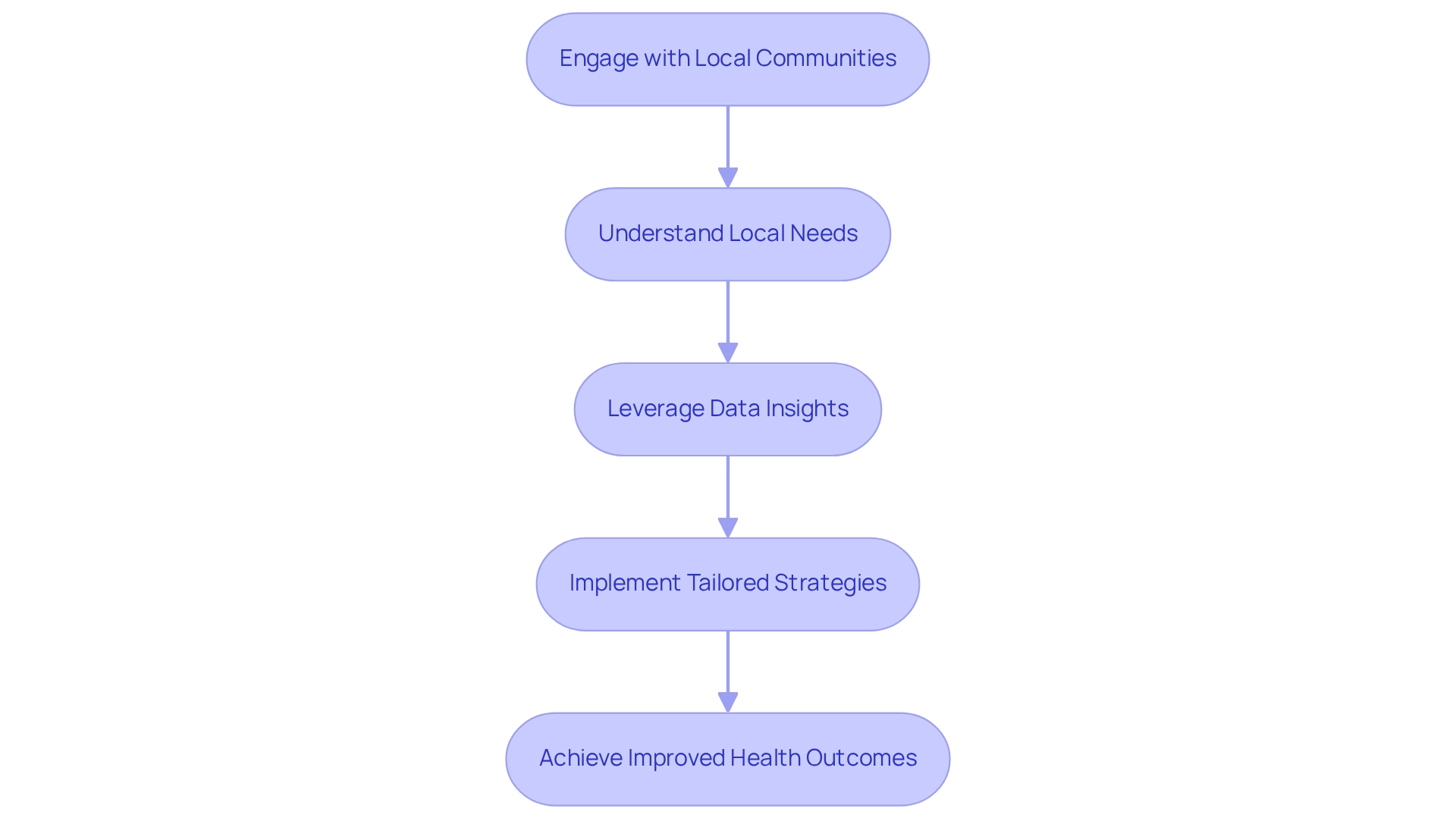
Patient Focused Medicine: Foster Collaborative Definitions of Patient Centricity
Patient Focused Medicine advocates a cooperative approach to defining patient centricity, engaging individuals receiving care, healthcare providers, and industry stakeholders in meaningful dialogue. This inclusive strategy fosters a deeper understanding of patient centricity, ensuring that initiatives are not only relevant but also tailored to the diverse needs of individuals across various contexts. In 2025, North America is projected to account for a significant 41.8% share of the global collaborative care model market, underscoring the region’s commitment to enhancing patient involvement and care quality. As noted, “North America is expected to lead the global collaborative care model market.”
Case studies illustrate the effectiveness of this collaborative definition, demonstrating how organizations that actively involve stakeholders in the decision-making process can create more impactful initiatives centered around patient centricity. For instance, CareSet’s extensive Medicare insights empower healthcare stakeholders by providing access to information from over 62 million beneficiaries and 6 million providers, facilitating timely and significant interactions with healthcare providers. A notable case study involves an oncology treatment manufacturer that successfully improved engagement with physicians regarding the 4th line of therapy for Gastrointestinal Stromal Tumor (GIST) through targeted data insights. Effective stakeholder interaction has been linked to enhanced treatment outcomes and greater client satisfaction, highlighting the tangible benefits of a cooperative framework. Additionally, advantageous reimbursement structures further bolster North America’s market supremacy, emphasizing the importance of patient centricity by involving patients in their care decisions as the medical landscape evolves. This engagement lays the foundation for more effective and personalized healthcare solutions.
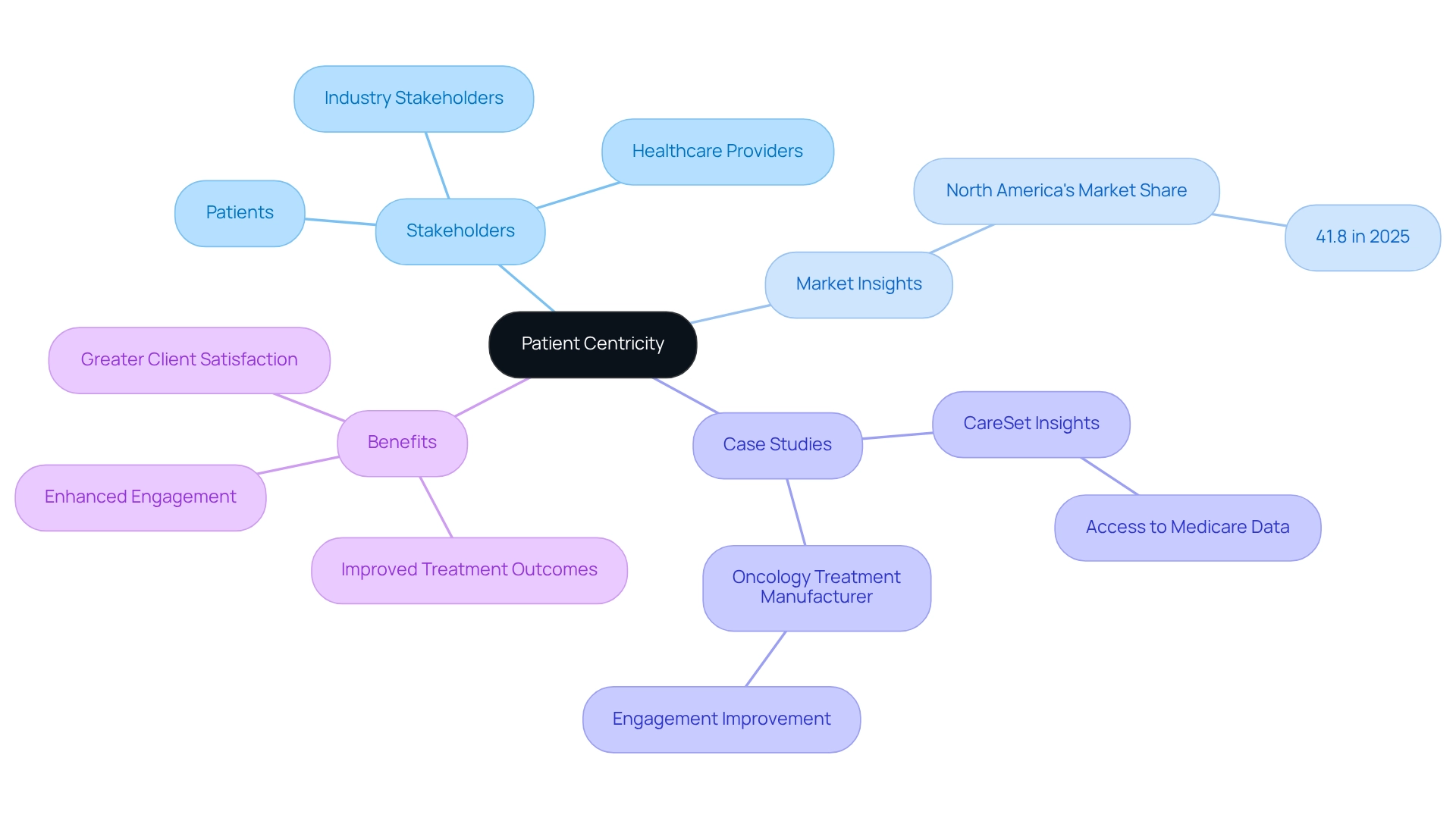
Conclusion
The exploration of patient-centricity in healthcare highlights the transformative power of data-driven strategies that enhance patient engagement and outcomes. Organizations such as CareSet, Astellas Pharma, IQVIA, and MD Group exemplify the significant improvements in patient experiences and satisfaction achieved through comprehensive data analytics. By leveraging Medicare insights, integrating patient feedback, and adopting innovative models like decentralized trials, these entities are reshaping the healthcare delivery landscape.
The economic advantages of prioritizing patient engagement are evident, with substantial returns on investment reported by organizations implementing these strategies. For instance, CareSet’s analysis indicates that effective patient engagement analytics can yield an ROI exceeding 3:1. This demonstrates that enhancing patient relationships not only improves health outcomes but also contributes to financial viability within the healthcare sector.
Ultimately, the commitment to fostering collaborative relationships between patients and providers is crucial in driving the shift toward personalized care models. As the healthcare industry continues to evolve, embracing patient-centric approaches will be essential for addressing the diverse needs of patients, improving health outcomes, and promoting a more inclusive and effective healthcare system. The journey toward patient-centricity transcends mere service delivery; it is about cultivating a healthcare environment where patients feel valued and empowered to take charge of their health.


